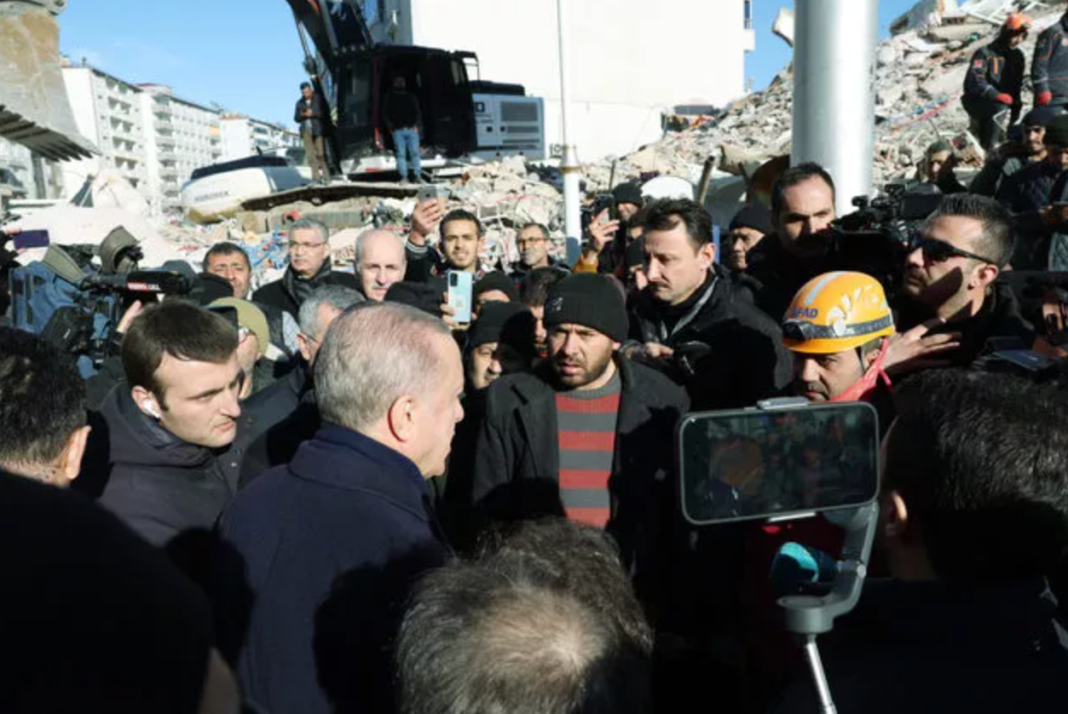« The fallout of the catastrophic earthquake comes as the country’s leader faces his toughest re-election campaign yet » Adam Samson and Laura Pitel report in Financial Times on February 10, 2023.
Last year, as Turkey marked the anniversary of an earthquake that ravaged parts of the country in 1999, Recep Tayyip Erdoğan hailed government “urban transformation projects” that would shield people from future catastrophes. “As humans, it is not in our hands to prevent disasters; yet, it is in our hands to take measures against their destructive impacts,” he said.
Now, the Turkish president stands accused of failing to do just that — and faces the enormous challenge of a vast humanitarian crisis. The country’s worst natural disaster in almost a century has already claimed more than 19,000 lives on their side of the border with Syria.
Erdoğan is now battling criticism that his government was too slow in getting help to stricken areas and that Turkey was ill prepared. It comes at a time when the president, who rose to national power just after the turn of the millennium, is waging his toughest re-election campaign yet.
“This is going to be the major issue in the election . . . [it] is terrible news for Erdoğan,” said Berk Esen, an assistant professor of political science at Istanbul’s Sabancı University.
Born in Istanbul into a working-class family, Erdoğan, now 68, began championing conservative politics as a teenager. The diehard football fan led an Islamic party’s youth branch in his early 20s.
He later shot to prominence when elected Istanbul mayor in 1994. In 2001, he founded the Justice and Development party (AK party), choosing an acronym that meant “pure” to contrast with the corrupt, chaotic coalition governments.
The AKP, which had roots in Turkey’s Islamist movement but cast itself as pro-European and pro-business, won in a landslide in 2002 as voters panned the incumbent’s economic mismanagement and handling of the İzmit quake.
“The 1999 earthquake was one of the reasons the governing parties not only lost but were wiped off the map,” said Atilla Yeşilada, an analyst at GlobalSource partners. Erdoğan, known for his powerful rhetoric and knack for getting things done, became prime minister in 2003. While much of his political energy was consumed by battles with the army and other institutions, he also embarked on a huge transformation of national infrastructure.
This gathered pace after the global financial crisis, as a wave of cheap money flooded in. Turkish prosperity increased while new hospitals, bridges, highways and airports sprang up.
But the AKP also loosened tender rules and built a web of business and political relations that awarded lucrative public tenders to friends in exchange for turning media outlets into propaganda organs — or funnelling money into foundations linked to the Erdoğan family. Repeated amnesties for illegal construction projects encouraged slapdash building practices.
A turning point came in 2013 when protests against a plan to build a shopping mall in Istanbul’s Gezi Park metastasised into a broader movement. Erdoğan launched a violent crackdown and began limiting civil liberties and curtailing freedom of the press. “Gezi really opened eyes and showed what this man is made of,” Yeşilada says.
A coup attempt in 2016 reinforced his turn towards more authoritarian rule. Since then, Erdoğan has tightened his grip on almost every government institution. Waves of purges in the civil service and a preference for loyalty over ability have further eroded the country’s institutions, political analysts say.
The fallout has been on display as the country endures one of its worst ever natural disasters. “This earthquake is the destruction of 20 years of window dressing. The results of the earthquake are the consequences of the hollowing out of Turkey’s institutions — disrespect and disregard for expertise,” says Soli Özel, lecturer at Kadir Has University.
Erdoğan has lashed out at political opponents and media who have criticised the response as slow and disorganised. Just a day after the quake, he said his government was keeping score of “those who intend to play our people against each other with false news” and warned “prosecutors are identifying [and] taking the necessary actions against those who attempt to create social chaos.”
The Turkish president has frequently harnessed past crises and turned them to his own advantage. But some political observers say that this one may prove beyond his control.
With elections scheduled for May 14, the earthquake will represent “the biggest political crisis that [Erdoğan] faces,” says Esen. It comes on top of a painful cost of living crisis, which economists say has been inflamed by his unconventional economic policies and has weighed heavily on his popularity.
The quake, which hit a string of poor, conservative provinces, may reduce support among his usually reliable base, says Özel. “It’s very difficult for me to decipher the codes of conservative Turkey, or pro-Erdoğan Turkey but I really cannot see how he can remain unscathed after this calamity.”
Even some AKP officials are raging at the terrible death toll — and the failures of his government to protect Turkey. “Why don’t [other earthquake-prone] countries like Japan, Chile have tragedies like we do?” said a party member from one of the devastated provinces, who had lost several relatives. “People are asking these questions now. And they will get louder.”
Financial Times, February 10, 2023, by Adam Samson and Laura Pitel.

